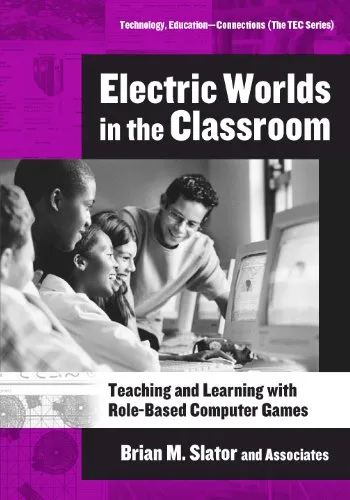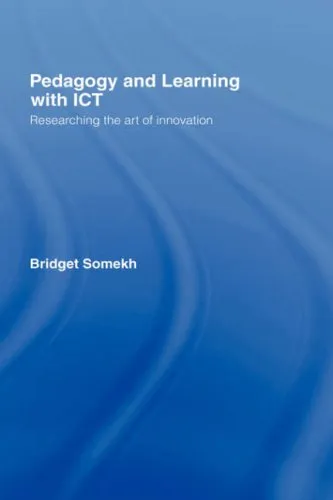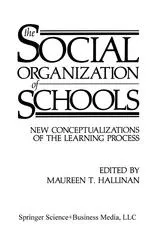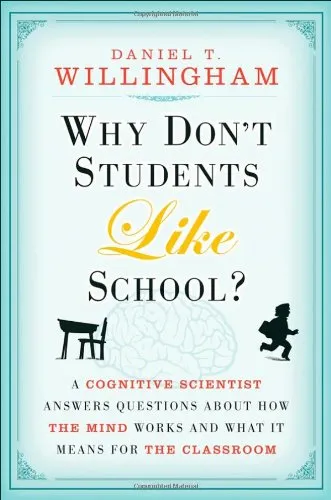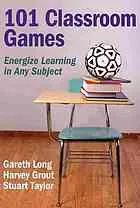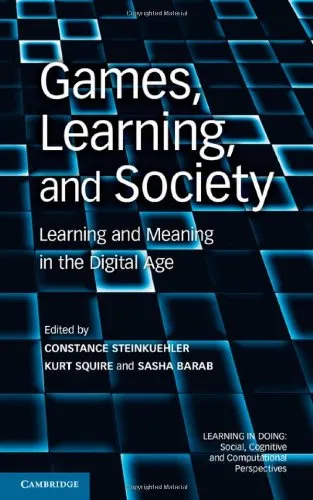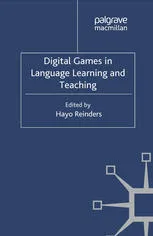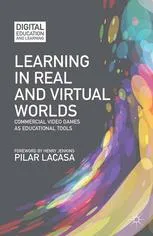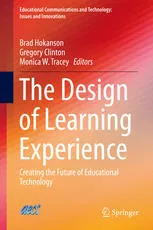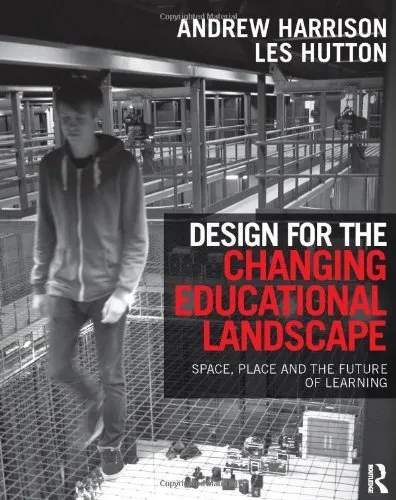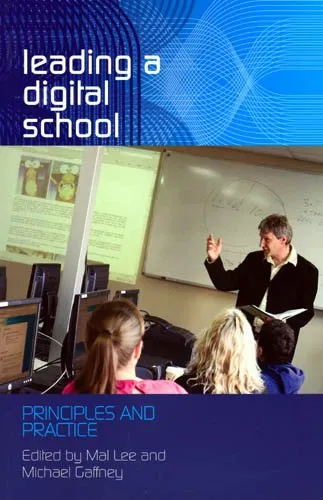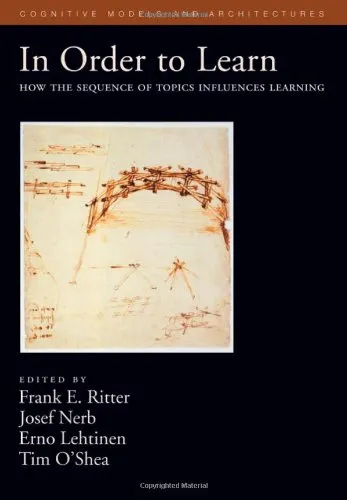Electric Worlds in the Classroom: Teaching And Learning With Role-based Computer Games (Technology, Education--Connections (Tec) Series)
4.0
بر اساس نظر کاربران

شما میتونید سوالاتتون در باره کتاب رو از هوش مصنوعیش بعد از ورود بپرسید
هر دانلود یا پرسش از هوش مصنوعی 2 امتیاز لازم دارد، برای بدست آوردن امتیاز رایگان، به صفحه ی راهنمای امتیازات سر بزنید و یک سری کار ارزشمند انجام بدینکتاب های مرتبط:
معرفی جامع کتاب "Electric Worlds in the Classroom: Teaching And Learning With Role-based Computer Games"
کتاب "Electric Worlds in the Classroom: Teaching And Learning With Role-based Computer Games"، نوشتهٔ Richard T. Beckwith، Harold Chaput و Brian M. Slator در سری Technology, Education--Connections (Tec) Series، یکی از ارزشمندترین منابع برای بررسی تکنولوژیهای نوین در آموزش است. این اثر بهطور تخصصی به مفهوم بازیهای کامپیوتری مبتنی بر نقش و استفادهٔ آنها در فرایند آموزش و یادگیری میپردازد. نویسندگان با بهرهگیری از تحقیقات جامع و تجارب عملی، به بحث در مورد چگونگی تأثیر این تکنولوژی ها در بهبود یادگیری و تعامل بیشتر میان دانشآموزان پرداختهاند.
خلاصهای از کتاب
در این کتاب، نویسندگان بهصورت جامع به تحلیل و بررسی نقش بازیهای کامپیوتری بهعنوان ابزاری آموزشی پرداختهاند. این بازیها که تحت عنوان Role-based Computer Games شناخته میشوند، با استفاده از چالشها، اهداف و سناریوهای جذاب طراحی شدهاند که میتوانند قابلیتهای یادگیری دانشآموزان را تقویت کنند. این اثر به موضوعات کلیدی از جمله طراحی بازی برای اهداف آموزشی، تاثیر بازیها بر تفکر انتقادی و مهارتهای حل مسئله، و همچنین نقش معلمان بهعنوان راهبران این فرآیند یادگیری پرداخته است.
یکی از نکات برجسته این کتاب، روشهای یکپارچهسازی بازیهای تعاملی در فرآیند کلاس درس است. نویسندگان، بر اساس پژوهشهای خود توضیح میدهند که چگونه این روشها نهتنها جذابیت آموزشی را افزایش میدهند، بلکه به دانشآموزان اجازه میدهند تا مفاهیم پیچیده را در محیطهای شبیهسازیشده بهصورت عملی و تجربی فرا گیرند.
نکات کلیدی کتاب
- چگونگی استفاده از بازیهای کامپیوتری برای تقویت یادگیری فعال و تجربی.
- تأثیر استفاده از Role-based Computer Games در توسعه مهارتهای شخصیتی و اجتماعی دانشآموزان.
- طراحی علمی و کاربردی کلاسهای مبتنی بر بازی برای سطوح مختلف تحصیلی.
- ارتباط میان تکنولوژی و آموزش برای تطبیق با نیازهای نسل جدید یادگیرندگان.
- مطالعات موردی از پروژههای موفق که نشاندهنده تأثیر مثبت این متدها در آموزش هستند.
جملات معروف از کتاب
“Learning is most effective when students actively engage in experiences that are relevant, meaningful, and designed to build critical thinking skills.”
“Role-based Computer Games enable learners to immerse themselves in dynamic, multidisciplinary challenges where they can experiment, fail, and ultimately succeed in safe, constructed environments.”
چرا این کتاب اهمیت دارد؟
دنیای امروز، دنیای تکنولوژی است و روشهای قدیمی تدریس دیگر پاسخگوی نیازهای یادگیرندگان جوان نیستند. این کتاب نشان میدهد که چگونه بازیهای مبتنی بر نقش، پلی میان یادگیری سنتی و مدرن میسازند. این ابزارها به دانشآموزان اجازه میدهند مفاهیم پیچیده را بهصورت عملی و در محیطی شبیهسازی شده تجربه کنند.
کتاب "Electric Worlds in the Classroom" منبع ارزشمندی است برای معلمان، پژوهشگران و طراحان بازیهای آموزشی. این کتاب نهتنها دیدگاههای جدیدی به یادگیری ارائه میدهد، بلکه راهکارهایی عملی و علمی برای اجرای آنها را نیز فراهم میکند. اهمیت این اثر همچنین در ارائه راهحلهایی برای چالشهای آموزشی عصر حاضر و تطبیق با نیازهای متغیر دانشآموزان بهخوبی مشهود است.
Introduction
Electric Worlds in the Classroom: Teaching and Learning with Role-based Computer Games provides an insightful and compelling exploration into the powerful intersection of gaming, education, and technology. Written by Richard T. Beckwith, Harold Chaput, and Brian M. Slator, this book investigates how role-based computer games can revolutionize traditional learning practices, engage students in meaningful ways, and create immersive educational experiences. Through real-world examples, detailed case studies, and critical analysis, the authors offer educators a roadmap to harness the potential of these transformative tools within classroom environments.
At a time when digital literacy and interactive learning are cornerstones of modern education, this book addresses critical questions: How can role-playing games (RPGs) foster critical thinking and creativity? What framework can schools implement to integrate game-based learning effectively? With its rich blend of theory and practical insights, Electric Worlds in the Classroom not only answers these questions but provides a guide to reimagine how we teach and learn in an interconnected, digital world.
Detailed Summary of the Book
Electric Worlds in the Classroom delves into the concept of using role-based computer games as educational tools, arguing that these systems have the potential to transform classrooms into dynamic, interactive environments. The authors begin by examining the theoretical foundation of learning through play, drawing from psychology, education research, and game design theory. They explore how role-based games leverage narratives, challenges, and collaboration to teach critical thinking, problem-solving, and teamwork.
The book presents case studies demonstrating how computer games have been implemented in various educational settings, from teaching language skills to fostering understanding in STEM subjects. These examples showcase the adaptability of role-playing games to different curricula and age groups, emphasizing how they engage students by letting them take active roles in their learning process.
Furthermore, the book explores the challenges of integrating game-based learning, such as technological constraints, resistance from traditional educators, and balancing gameplay with academic rigor. By addressing these issues head-on, the authors provide actionable strategies for overcoming barriers and crafting effective game-based learning experiences.
Key Takeaways
- Role-based computer games foster creativity, critical thinking, and collaboration by immersing students in rich, interactive worlds.
- Game-based learning can enhance engagement and motivation, especially in subjects where traditional teaching methods often fall short.
- Successful implementation of educational games requires an understanding of pedagogical goals, thoughtful design, and alignment with curriculum standards.
- Educators must overcome challenges such as access to technology, skepticism about gaming in education, and training to integrate games effectively into lessons.
- The intersection of education and technology opens up opportunities for more inclusive, personalized, and meaningful learning experiences.
Famous Quotes from the Book
"When classrooms embrace the narratives of role-based games, they invite every student to become a hero in a story shaped by knowledge, collaboration, and exploration."
"Learning, at its core, is an adventure. Games provide the tools to take that adventure to bold new landscapes our textbooks alone cannot reach."
"Educational innovation lies not in replacing teachers but in empowering them with new tools to bring their lessons to life."
Why This Book Matters
Electric Worlds in the Classroom is more than just a book about games—it’s a manifesto for the future of education. At a time when teachers struggle to keep students engaged and motivated, this book opens the door to a transformative approach that meets learners where they are: in the digital worlds they already inhabit.
The insights offered by the authors are particularly relevant today, as education systems worldwide adapt to evolving technologies and seek to make learning more inclusive and effective. With role-based computer games, educators can create experiences that are not only fun but deeply impactful, inspiring students to think critically, experiment boldly, and collaborate effectively. It’s a vision of education that blends the best of human creativity and digital innovation.
Additionally, this book empowers teachers by providing clear strategies and tools to embrace change without losing sight of core educational principles. It is a must-read for educators, policymakers, and technologists who seek to bridge the gap between traditional learning and the opportunities of the digital age.
دانلود رایگان مستقیم
شما میتونید سوالاتتون در باره کتاب رو از هوش مصنوعیش بعد از ورود بپرسید
دسترسی به کتابها از طریق پلتفرمهای قانونی و کتابخانههای عمومی نه تنها از حقوق نویسندگان و ناشران حمایت میکند، بلکه به پایداری فرهنگ کتابخوانی نیز کمک میرساند. پیش از دانلود، لحظهای به بررسی این گزینهها فکر کنید.
این کتاب رو در پلتفرم های دیگه ببینید
WorldCat به شما کمک میکنه تا کتاب ها رو در کتابخانه های سراسر دنیا پیدا کنید
امتیازها، نظرات تخصصی و صحبت ها درباره کتاب را در Goodreads ببینید
کتابهای کمیاب یا دست دوم را در AbeBooks پیدا کنید و بخرید
1341
بازدید4.0
امتیاز0
نظر98%
رضایتنظرات:
4.0
بر اساس 0 نظر کاربران
Questions & Answers
Ask questions about this book or help others by answering
No questions yet. Be the first to ask!
